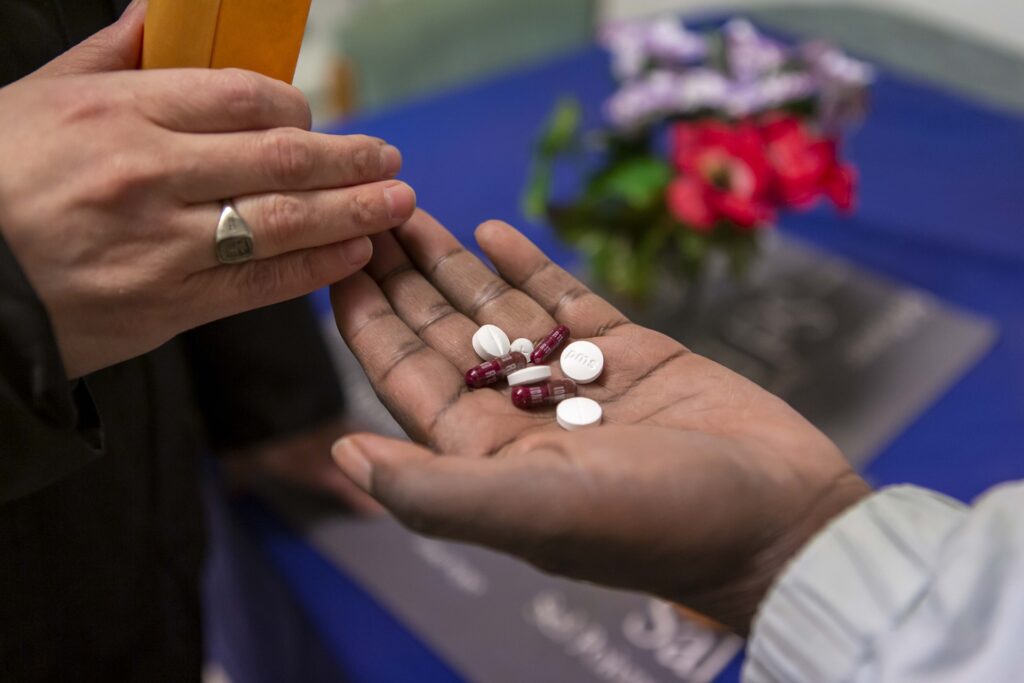By Destiny Uko
In a country where counterfeit drugs continue to claim thousands of lives yearly, the ability to detect fake medicine has become indispensable.
Nigeria has long battled the scourge of fake drugs, which often enter the supply chain through unregulated markets, roadside vendors, and even some poorly supervised pharmacies. In the midst of this crisis, technology is quietly empowering everyday Nigerians to fight back through simple, mobile-friendly solutions.
The most common method now available to Nigerians for detecting fake drugs is the Mobile Authentication Service, better known as MAS. This system was introduced by the National Agency for Food and Drug Administration and Control (NAFDAC) as a way to make drug verification accessible to everyone, regardless of their education level.
Many genuine drugs in Nigeria now come with a scratch panel concealing a unique PIN code. To confirm whether the drug is authentic or counterfeit, the consumer scratches the panel and sends the PIN as a text message to 38353. Within seconds, a message is returned, stating whether the drug is “original” or “fake.”
Beyond SMS codes, mobile apps have emerged as another layer of defence against counterfeit drugs. One of the most widely adopted platforms is Sproxil. This service works with pharmaceutical companies to print verification labels on their products.
Consumers can either send the code via SMS or scan it using the Sproxil mobile app. Once entered, the system instantly checks the product’s authenticity and provides feedback. The app also offers additional services such as rewards, customer feedback, and safety alerts, helping to build trust between consumers and drug manufacturers.
Another notable app is mPedigree, which also enables users to verify the authenticity of medicines through codes on packaging. The platform has been adopted by several drug manufacturers in Nigeria and across other parts of West Africa. mPedigree not only helps end-users but also enables manufacturers and distributors to monitor and trace the journey of their products from production to retail.
Despite the presence of these tools, one major challenge persists: many Nigerians still do not know that such services exist.
The use of MAS and mobile verification apps is still low in many communities, especially where drug purchases happen through bus stops, local markets, or roadside sellers. Awareness about verification codes is growing, but it is not yet widespread enough to make a significant dent in this regard.
To address this, both the government and non-governmental organisations are beginning to invest in more public education campaigns. NAFDAC, in partnership with United Nations Office on Drugs and Crime (UNODC), has run sensitisation programmes on radio, television, and social media to teach people how to identify and report fake drugs.
Community pharmacists also have a crucial role to play. Some pharmacies in urban centres now take time to show customers how to verify drugs before purchase. In addition, certain hospitals and retail points are training their staff to use bulk scanning tools that allow them to validate entire batches of medicine before dispensing them to patients.
The private sector is not left out. Some pharmaceutical companies now run awareness campaigns alongside their verification tools. For example, they may include safety warnings on drug packaging, radio jingles, or posters in local languages in rural markets.
In order to move from awareness to actual impact, certain structural challenges must also be addressed. For instance, there must be a crackdown on the continued sale of drugs that do not carry verification codes. Regulatory enforcement at the grassroots level must be strengthened, and vendors who sell unverified or expired medications must be penalised.
Furthermore, telecom companies must ensure that SMS verification remains affordable or free, especially for users in rural communities who already struggle with basic access to healthcare.
In a country where fake drugs still lurk in everyday spaces, these apps and SMS codes represent a form of digital empowerment that places safety into the hands of the people.
If supported properly, they can bridge one of the most dangerous gaps in Nigeria’s public health system. But beyond access, there must be a national shift in mindset. Medicine should never be a gamble, and the technology now exists to make sure it is not.
In Nigeria, the prevalence of counterfeit drugs, often distributed through unregulated markets and poorly supervised pharmacies, poses a significant public health risk. To combat this, mobile technologies like the Mobile Authentication Service (MAS) and apps such as Sproxil and mPedigree provide tools for consumers to verify drug authenticity through unique codes. By sending codes via SMS or scanning with apps, users receive immediate confirmation about whether a drug is real or fake. Despite these innovations, many Nigerians remain unaware of these services, with low adoption rates in areas dominated by informal drug transactions.
Efforts to increase awareness include public education campaigns by NAFDAC and partnerships with the UNODC. Community pharmacists and hospitals are also educating consumers and staff on drug verification. Pharmaceutical companies contribute by running awareness initiatives and including warnings in local languages. However, challenges remain, like the need for strict enforcement against selling non-verified drugs and ensuring SMS verification is affordable or free to boost rural access.
These technologies represent a significant opportunity for improving public health safety in Nigeria, but achieving impactful change requires both structural enforcement and a shift in public mindset towards recognizing the importance of drug verification.






